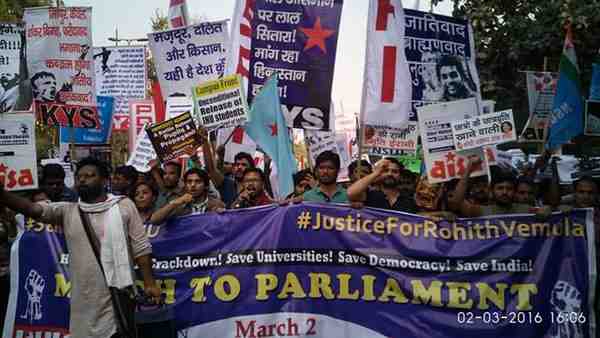JNU Students Approach Human Rights Commission

Student leaders have written a letter to the National Human Rights Commission, which many believe is a toothless department that cannot challenge government decisions.
By Rakesh Raman
As the ongoing melee between the Narendra Modi-led BJP government and the student groups in India has reached a point of no return, the Jawaharlal Nehru University Students’ Union (JNUSU) has approached a local human rights body to seek justice.
JNUSU president Kanhaiya Kumar and other union leaders, including Shehla Rashid and Rama Naga, have written today a letter detailing the situation in Hyderabad Central University (HCU) to the government-run National Human Rights Commission (NHRC), which many believe is a toothless department that cannot challenge government decisions effectively.
In their letter, JNUSU leaders have sought a detailed inquiry into the matter that led to “sharp brutality of police action on peacefully protesting students” on March 22 at HCU.
[ Can Kanhaiya Kumar Achieve Social Democracy for India? ]
According to the letter, 25 students and two faculty members were arrested and several students were injured in the police action. The students have also blamed the university administration for mishandling the situation at HCU campus. The student protests at HCU are being organized to know the cause that led to the death of a student Rohith Vemula.
The assault on the students and teachers at HCU last week was one of the most brutal crackdowns on the students in a University space, the students said in their letter, adding that the academic environment in the university remains under threat from heavy presence of the police forces.
[ Also Read: How India Abuses Children’s Right to Education ]
Students say that the Modi government – and particularly the education minister of India – is exercising undue interference in universities to establish a Hindu hegemony in the educational institutions.
Recently, the Modi government used the police force to arrest a few students from JNU under the draconian sedition law while there was hardly any evidence against the students.
The JNUSU leaders assert that the rampant arrests of students across the country and the slapping of various charges on student activists signal a situation of extreme alarm and a nervous attempt by the state to crush dissenting voices.
Clearly, the students say, these blatant attempts to crush the democratic voices of students and academia have been noted by numerous sections of the society and have caused a sense of alarm over the state of democracy, human rights, and dissent in the country.
By Rakesh Raman, the managing editor of RMN Company
You also can read: More Articles by the RMN Editor, Rakesh Raman






